Peter H. Kahn, Jr.
Professor
Department of Psychology
Box 351525
University of Washington
Seattle, Washington 98195-1525
206-616-9395 (office)
pkahn@u.washington.edu
Last updated:
Thursday, 13-Dec-2012 16:14:08 PST
|
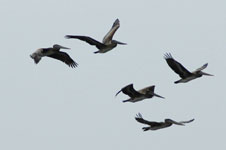
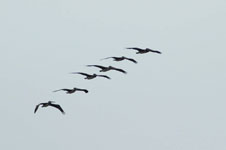
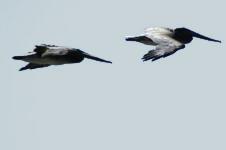
Books
The Rediscovery of the Wild
The MIT Press (2012)
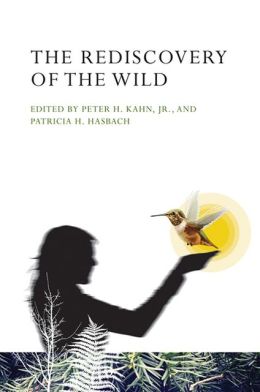
|
"No other wild-writing has drawn on such a robust set of commentators, of such stature, coming from so many divergent fields. This collection speaks very well to our present ambiguity about wilderness and wildness, and what we might do about it."
Michael Pyle
Author of The Thunder Tree and The Tangled Bank
" The Rediscovery of the Wild is an important and courageous book. It takes a convincing stand against the many forces that diminish both wilderness and the idea of wilderness and, in doing so, strip-mine the imagination and isolate the human spirit from the sources of its strengths and values. There is a difference, these essays tell us, between the call of the outdoors and the call of the wild -- the redemptive howls of wind and wolves. May we humans listen with our soft ears and lonely hearts."
Kathleen Dean Moore
Author of Wild Comfort
"The intrepid authors of The Rediscovery of the Wild fight a well-coordinated rear-guard skirmish against what one author perceptively characterizes as a postmodern tendency 'of seeing wildness as a doddering concept on the brink of extinction.' This book is an unapologetic old-school defense of what another author calls 'The Old Rules.' As we enter the brave new 'Anthropocene,' what are we getting in trade for the concept of wild Nature? These essays are a cautionary tale indeed."
J. Baird Callicott
University Distinguished Research Professor, Department of Philosophy and Religion Studies, University of North Texas
|
[Top]
Ecopsychology: Science, Totems, and the Technological Species
The MIT Press (2012)
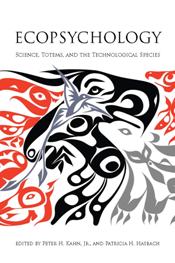
|
"The essays contained in Ecopsychology are the benchmark from which all subsequent elaborations of the discipline will proceed. The introduction and the afterword, by Peter Kahn and Paticia Hasbach, neatly summarize ecopsychology's history, achievements, and challenges. The book does not propose regression to romantic, pre-technological view of nature but rather the use of modern empirical science to forge a fusion between our natural love of the earth, its health, and our own -- physical and spiritual. This is the canonical text of a new and exciting discipline."
Jack Turner
Author of The Abstract Wild
"By bringing so many thoughtful and provocative thinkers together, Peter Kahn and Patricia Hasbach have prescribed a 21st century human-nature reunion through which individuals, families, and communities offer and receive the gifts of nature; a future in which, as a species, we no longer feel alone; and a world where life returns."
Richard Louv
Author of The Nature Principle and Last Child in the Woods
"This remarkable collection of stunningly important papers remind us of our deep evolutionary, biological and emotional connection to the natural world. Our species, Homo sapiens, undoubtedly the most intelligent and powerful species on Earth, must revere our creator, Nature. Nature nourishes and we must nourish Nature and responsibly embrace our responsibilities to ensure the future of all life on this delicate planet. "
Donald Johanson
Professor and Founding Director, Institute of Human Origins, School of Human Evolution and Social Change, Arizona State University
|
[Top]
Technological Nature: Adaptation and the Future of Human Life
The MIT Press (2011)
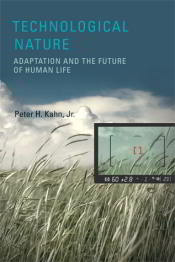
|
"Technological Nature is a deeply compelling book. Our species spent 150,000 years as hunter-gatherers of the African savannah, and Kahn clearly demonstrates that ancestral memories of this are with us still, leaving us with an emotional need for nature and the desire to find substitutions for it. His thesis is unique, his work is breathtakingly original, and his presentation has created a real page-turner."
Elizabeth Marshall Thomas
Anthropologist, author of The Hidden Life of Dogs and The Old Way: A Story of the First People
"Peter Kahn, a pioneering researcher on the human relationship with nature, offers a beautifully written, sometimes disturbing, and always provocative tour of the disappearing borderland between machinery and humanity. Kahn thinks at the cutting edge."
Richard Louv
Author of The Nature Principle and Last Child in the Woods
"Understanding our interactions with 'technological nature' is one of the most pressing concerns of this century. Peter Kahn's outstanding and insightful book delivers the first comprehensive treatment of this critical topic."
Scott Sampson
Science Advisor and Host, PBS Kids' Dinosaur Train
Research Curator, Utah Museum of Natural History
Author of Dinosaur Odyssey: Fossil Threads in the Web of Life
"In this engaging and provocative book, Peter Kahn explores how technology can simulate the natural world. Kahn has written something unusual and important&emdash;a fascinating review of ongoing scientific research, a considered exploration of human development, and a passionate defense of the value of nature."
Paul Bloom
Professor of Psychology and Cognitive Science, Yale University
Author, How Pleasure Works
"Many today believe human life has become the product of mainly invention and technology. To be modern, they believe, is to separate from the animal world, becoming something different from the rest of living creation. In this world, they wonder, who needs real nature? Yet, as a species, are we necessarily richer for all these gains in terms of health, happiness, and biological fitness? Despite our remarkable capacity to reach far beyond our biology, does our inventiveness continue to rely on having evolved in a natural, not human-created world? This book helps confront this question of the role of modern technology in our lives and where we fit in nature."
Stephen R. Kellert
Tweedy Ordway Professor Emeritus of Social Ecology, Yale University School of Forestry and Environmental Sciences
|
[Top]
The Human Relationship with Nature: Development and Culture*
The MIT Press (1999)
* Winner of the 2000 Moral Development and Education Book Award (American Educational Research Association)
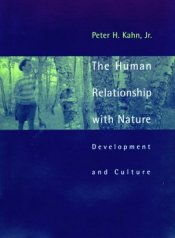
|
"Peter Kahn addresses a subject important to humanity correctly, not as an advocate of genetic or cultural hypotheses, but as a scholar pondering the way in which the two forms of evolution are interwoven. His conclusions are informed by his own considerable research, presented in a clear and interesting manner. This is a significant contribution to the understanding of the human condition."
Edward O. Wilson
Research Professor and Honorary Curator in Entomology,
Museum of Comparative Zoology, Harvard University
"Peter Kahn has written a sweeping and original account of the relationship between people and their living environments. The studies in Kahn's ambitious book open new doors into an important area of psychological study, and his bold theorizing adds greatly to our knowledge of developmental universals as well as cultural variation in how humans relate to the natural world."
William Damon
Professor and Director, Stanford Center on Adolescence
"Peter Kahn provides a new perspective on development and culture through his perceptive, deep, and wide-ranging analyses of humans' relationship with nature and its moral implications. This is a truly interdisciplinary work that informs and is informed by several fields of scholarship. Written very clearly, this book contributes greatly to developmental, cultural, environmental, and educational studies."
Elliot Turiel
Professor, University of California, Berkeley
"Using a developmental psychology framework, Peter Kahn provides a unique and much-needed addition to our scientific understanding of the human-nature relationship, particularly its biological origins and the influence of culture and learning in child development. This book is an important scholarly accomplishment with significant environmental education and conservation implications, all the more valued for its clear and accessible writing."
Stephen R. Kellert
Professor, School of Forestry and Environmental Studies, Yale University
"Here is the love of life (biophilia) both transculturally and with a difference. Kahn finds empirical support for a genetically based human need to affiliate with life. Enlarging the interpretive framework beyond human interests and our selfish genes, Kahn discovers a more embracing love of life, as humans realize deeper connections with and appreciation for other species. Such convictions can develop even among children, documented by cross-cultural studies. That corrects the postmodern claim that nature is our cultural construction. This penetrating analysis is the best yet blending of philosophical analysis and empirical research."
Holmes Rolston, III
University Distinguished Professor, Department of Philosophy, Colorado State University
"Kahn has written a magnificent book that seamlessly integrates developmental theory, environmental ethics, and environmental education while raising important methodological and epistemological questions."
Mitchell Thomashow
Director, Doctoral Program in Environmental Studies, Antioch New England Graduate School
|
[Top]
Children and Nature: Psychological, Sociocultural, and Evolutionary Investigations
The MIT Press (2002).
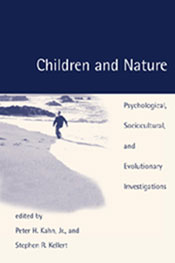
|
"Nothing is more important to us than our children, and nothing is more important to our children than maintaining a high quality environment. If they are to have a benign and nurturing environment, much will depend on the ideas and surroundings they are exposed to today. The authors in "Children and Nature" discuss a fascinating and diverse range of topics related to these critical issues. Everyone with an interest in the human future could profit from reading it."
Paul R. Ehrlich
Bing Professor of Population Studies
and President, Center for Conservation Biology, Stanford University
"Propagating a love of nature may ultimately be the most important pathway out of the biodiversity crisis. But how do people develop a sense of awe and reverence for the natural world? "Children and Nature" explores this most fundamental question. Educators, naturalists, environmentalists, parents, and anyone interested in communicating and fostering a deep regard for nature will greatly benefit from the highly stimulating explorations and discourses in this book."
Carl Safina
Vice President for Marine Conservation, National Audubon Society
Author of "Eye of the Albatross" and "Song for the Blue Ocean"
"This book has an astonishing number of insights per page. The authors carefully provide good reasons to believe that experiences in nature are a cornerstone for the development of healthy children, who learn to act wisely in the environment and to create healthy societies."
Chris Myers
Professor and Director of Project Dragonfly, School of Interdisciplinary Studies, Miami University
|
[Top]
|







